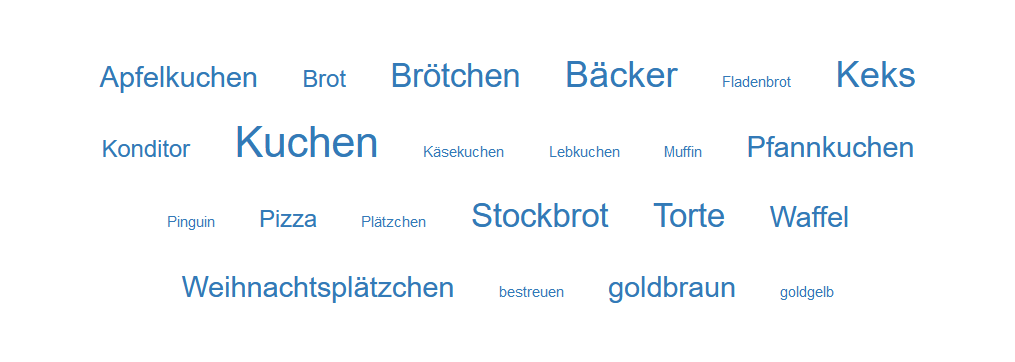Vocabulary Module 14: backen
In this module, you will learn some vocabulary to talk about baking (backen) and baked goods using Das Digitale Wörterbuch der Deutschen Sprache (DWDS), a large electronic collection of German texts known as a corpus. Let’s explore what words German speakers use to talk about baking. Go to the DWDS homepage and type backen in the search box. You will be taken to a page that gives you a lot of information about this word, but we will focus on the so-called ‘word cloud’ which is available in the Typische Verbindungen section.

This word cloud shows the words that commonly occur with the word backen; such words are known as collocates. The larger the word in the image is, the more often it co-occurs with backen. You can also see a numerical representation of the frequency of co-occurrence by looking at the Überblick table for backen accessible through the Detailliertere Informationen link above the word cloud.
Activity 1
A.
First, let’s review the meaning of some German nouns which are frequently used with the verb backen by matching them with their English equivalents. If needed, you can consult the online dictionary LEO.
B.
It is important to learn the German nouns together with their articles. Look at the 17 nouns from 1A and identify 9 nouns that go with der, 3 nouns that go with die, and 5 nouns that go with das.
Activity 2
A.
Read the sentences below, which contain examples with backen taken from the DWDS corpus. What is being baked in the examples?
B.
Stockbrot is another word frequently used with backen. Read the DWDS examples below and try to figure out its meaning:
- Von 11 bis 18 Uhr können Kinder unter Anleitung ein Floß bauen, mit Booten paddeln, am Lagerfeuer Stockbrot backen.
Bild, 10.07.2004 - Die Mädchen und Buben, allesamt im Grundschulalter, sind aufgeregt, schließlich werden heute Stockbrote gebacken.
Süddeutsche Zeitung, 02.09.2003 - «Nicht jeder kann ein Zelt aufbauen, angeln oder Stockbrot backen», sagte Fink.
Die Zeit, 02.08.2012 (online)
Activity 3
A.
Next, let’s further explore the word Brötchen, a frequent collocate of backen. Click on the word Brötchen in the word cloud for backen (or you can search for Brötchen from the main DWDS page). Scroll down to the word cloud. You can see many different adjectives that are frequently used to describe Brötchen. Some of these adjectives are listed below; match them with their English equivalents. If needed, you can consult the online dictionary LEO.
B.
Brötchen are popular in all German-speaking regions, but they are called differently in different regions. Look at the list of regional synonyms under Thesaurus (located right above the word cloud). Now, put the correct word with its region together.
C.
Now, read the examples with the idiom “kleine Brötchen backen” below and try to figure out its meaning.
- Finanziell muss Stöver bei seinem neuen Klub zunächst einmal kleinere Brötchen backen.
Die Zeit, 03.05.2016 (online) - Auch Deutsche mit ausländischen Wurzeln meinen, dass Zuwanderer in den ersten Jahren nach ihrer Ankunft erst einmal kleine Brötchen backen sollten.
Die Zeit, 07.07.2016 (online) - »Wir mussten entscheiden«, so Junhold, »ob wir künftig kleinere Brötchen backen oder richtig groß investieren.«
Die Zeit, 18.02.2010, Nr. 08 - „Wir können auch kleine Brötchen backen“, meinte Albert Becker, Pressesprecher des MCV, „die Besucher werden wohl Verständnis haben, wenn der Fastnachtszug nicht ganz so prachtvoll wie sonst abläuft.
Die Zeit, 07.11.1975, Nr. 46
Activity 4
A.
Let’s further explore two noun collocates of backen: Kuchen and Torte. Search for Kuchen from the DWDS main page and scroll down to its word cloud. Then, open a new window and search for Torte from the DWDS main page and scroll down to its word cloud. Keep both windows (one with the word cloud for Kuchen and one with the word cloud for Torte) open to complete the following activity.
You probably noticed that many of the same words are frequently used with both Kuchen and Torte. But can you find three words that are used only with Torte? Use the LEO dictionary if you need to find a translation.
B.
Read the examples taken from the DWDS website below and decide what word is commonly used with Kuchen.
C.
Based on the examples from 4B (you can find many more examples by searching for Kaffee und Kuchen from the Korpora im DWDS website), what activities is this expression associated with?
Activity 5
A.
Now, let’s compare the usage of two adjective collocates of both Kuchen and Torte: lecker and köstlich. Search for lecker from the DWDS main page and scroll down to its word cloud. Then, open a new window and search for köstlich from the DWDS main page and scroll down to its word cloud. Keep both windows (one with the word cloud for lecker and one with the word cloud for köstlich) open to complete the following activity.
You probably noticed that many of the same nouns are frequently used with both lecker and köstlich. But can you find four words that are used only with köstlich? Use the LEO dictionary if you need to find a translation.
B.
Based on the examples from 5A, choose the statement that best describes the meaning of lecker and köstlich.
C.
Next, look at the 11 nouns that you learned in Activity 5A and identify 3 nouns that go with der, 5 nouns that go with die, and 3 nouns that go with das.
Activity 6
On your own. Using the word clouds from this module, write 4-5 sentences about backen and German food.
For example:
Ich backe jeden Sonntag eine Pizza.
Die Kinder essen die belegten Brötchen zu Mittag.
Meine Mutter serviert einen selbstgemachten Käsekuchen.
Schirin Kourehpaz & Nina Vyatkina

